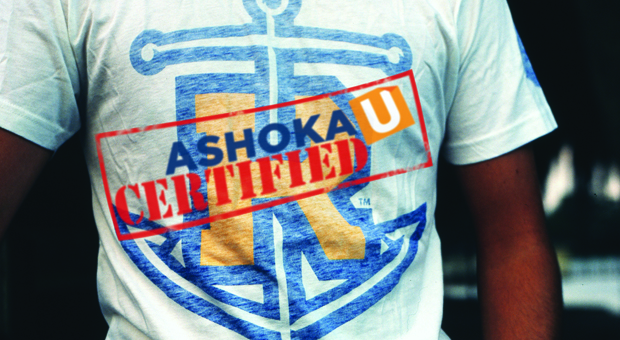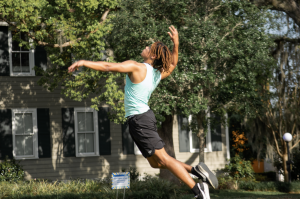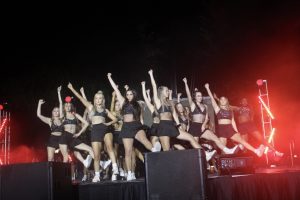Free food, free T-shirts, & something about a treasure chest with an iPad and more T-shirts inside.
Now that the festivities of Changemaker Campus Day are behind us, lets figure out what it was that we were actually celebrating last week and what we’ve gotten ourselves into.
On Sept. 6, Rollins celebrated Campus Changemaker Day; the festivities kicked off with an induction ceremony held by President Duncan in front of Knowles Memorial Chapel, where Rollins was officially designated an Ashoka U Changemaker Campus. Before and after the ceremony, students gathered on the Fiat Lux walkway for a social entrepreneurship involvement fair to learn about internships, immersion trips, and field studies geared towards creating social change.
To close the celebrations, Pulitzer Prize-winning author of Half the Sky, Nicholas Kristof, spoke in-depth to students about his book and the significance of social innovation. He described the occasion of Rollins’ Changemaker designation as “a time to celebrate,” and at the Changemaker Campus event, many students did. But after questioning students randomly around campus, it was clear that the exact cause for celebration, or even what a Changemaker Campus is, wasn’t exactly common knowledge.
“I don’t know, I read some article that said it had something to do with social entrepreneurship, but other than that I don’t know,” said Zach Baraf ’13. “I’ve never heard of a Changemaker Campus before and I’ve never even heard of another school being a Changemaker Campus.”
There was uncertainty among freshmen as well: Ryan Scanlan ’16 guessed, “I think it means that you care about your community and your society.”
One of the few students who knew and understood what the Changemaker designation entailed was Justin Mitchell ’13. “[Changemaker] is a great honor, Ashoka is an amazing organization. It’s amazing that they think we try to make a difference on this campus.” Mitchell is a Peer Mentor this fall and was briefed about Ashoka and Changemaker’s signifigance at a workshop during his training.
What is it?
Rollins was certified a Changemaker Campus, a designation presented by a branch of Ashoka, a global association of the world’s leading social entrepreneurs, all of whom are committed to investing in social change. The branch, Ashoka U, focuses solely on higher education institutions, spreading the idea of social entrepreneurship to the next generation. According to Ashoka U’s website, the organization works to develop, advance and catalyze higher education institutions by providing resources and models to accelerate change leaders that share their vision. The Ashoka Changemaker Initiative aims to spread campuses’ strategies and common practices throughout their global network. Ashoka U Changemaker designations are presented to institutions that are “best equipping students with the tools to becoming social innovators,” said Chrissy Garton, Social Entrepreneurship and Sustainable Enterprise Program Manager.
How did we get it?
Garton explained that the designation was acquired after completing a four-step application process. According to the Selection Process section of Ashoka U’s website, there are several phases that an eligible campus must complete to become a certified Changemaker Campus. Phase one and two include submitting and refining a 360 Campus Scan, an all-encompassing evaluation of evidence that demonstrates the school’s demand for social entrepreneurship opportunities on campus. The website indicates that these two steps require a $1,200 fee. This is followed by an on-site visit from an Ashoka representative to campus; during this visit, the representative stays on campus for one night to conduct interviews, assess the campus’s changemaking potential and offer final recommendations for the final steps of the application process. This step carries a fee of $5,000. The last step entails a convention held in Washington D.C. where institutions send representatives to speak with an Ashoka U selection panel. Within a week of the selection panel, a final fee of $10,000 cover a September launch and designation ceremony at the Ashoka U Exchange.
At the time that Rollins began the selection process, the $1,200 fee for the 360 Campus Scan was not in place. However, Rollins did pay the $5,000 on-site visit fee as well as the $10,000 launch and designation ceremony fee. According to Garton, the $15,000 partnership fee was made possible through a donation from David Lord, the Chairman of the Board of Trustees who is known to be an advocate for community engagement. The partnership fee covers a lifetime membership with Ashoka U.
Is it an award?
In the Orlando Sentinel coverage of the launch at Rollins, Marina Kim, Co-Founder and Director of Ashoka U, claimed the Changemaker designation to be “the equivalent of an Oscar or Nobel Prize for social change and impact.” However, her statement is contradicted by the four-step application process and its partnership fees. In addition to meeting the rigorous criteria required for this designation, $15,000 was required over the course of the aforementioned process. An Oscar or Nobel Prize are honors accrued by nominations and are not associated with fees.
“Ashoka U could provide their services for free,” said Garton, “but the partnership fee allows them to do a more effective job by not having to apply for grants or funds.”
Michele Leaman, Changemaker Campus Director for Rollins, elaborated on the reasoning behind the partnership fee. Having worked in the past at non-profit organizations associated with higher education, she recognized that relying 100% on grants and donors was not a practical option, especially in tough economical times. When she began her work at Ashoka U, she understood that accepting partnership fees was a more sustainable practice and allowed for effective sharing of resources and social entrepreneur tools.
Now what?
Other than the crime scene tape that has plagued campus, the Changemaker designation has initiated some actual immediate changes: According to Garton, a Social Entrepreneurship and Sustainability Initiative (SESI) facility was established on campus. “The creation of SESI shows that the school sees a need for something like it as an institutional priority,” Garton said. “This is a brand new program which is why we made such a big splash at the event last week. The whole [Changemaker Campus Day] was set up to help students learn more about opportunities and figure out how to get involved.” Garton claims to be receiving daily e-mails and visits from students and faculty inquiring about social entrepreneur opportunities. “We have the resources. It’s up to students to utilize them.” SESI will offer students paid internship and field-study opportunities, immersion trips and advice for life after Rollins. Fused with Kristof’s Half the Sky, which he deems a “how-to guide to social change,” the SESI facility will provide “a practical way to save the world,” said Garton. As of now, the SESI facility is contained to Garton’s small Warren building office.
Considering that the Changemaker certification’s establishment took place only a few years ago in 2008, the designation is still relatively unknown to those not directly involved with social entrepreneurship. This designation, as stated by Garton, is “uncharted territory” meaning that it is uncertain whether or not it will give Rollins students a leg up either while still enrolled or after graduation.
Will it be worth it?
Between the large-scale launching ceremony, the inviting of a Pulitzer Prize winner, the organizing of the social entrepreneurship involvement fair and the establishment of the SESI facility, it appears that the Changemaker designation holds much significance for Rollins. However, there is a noticeable disconnect between the Rollins vision of a Changemaker Campus and the reality of a need for concrete planning and the higher awareness required for a significant amount of students to benefit from the Ashoka U partnership.
As of this year, Ashoka U has instated an annual renewal process for current Changemaker Campuses to ensure that they uphold the criteria the designation requires. The hope is that after all of the hard work and financial investments made to receive the designation, Rollins will not only pass each renewal process, but also take full advantage of Ashoka U resources and make its benefits and opportunities better known to students.










Be First to Comment